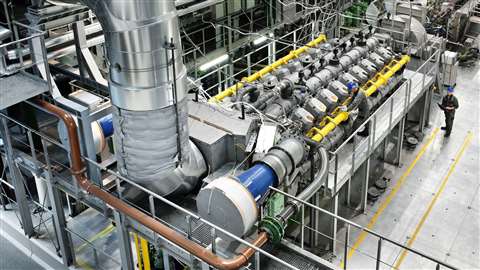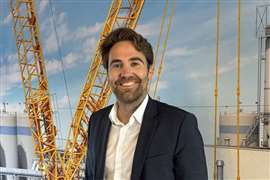MAN says gas engines are hydrogen ready
04 November 2021
Meet European Engine Power Plant Association standard
MAN Energy Solutions announced that its gas-powered, four-stroke engines are operable in stationary mode with a hydrogen content of up to 25% by volume in a gas-fuel mix.
As such, within the power-plant segment, the company’s MAN 35/44G TS, 51/60G and 51/60G TS gas engines are now designated as H2-ready and capable of exploiting hydrogen to further reduce CO2 emissions. This hydrogen-combusting capability enables MAN gas engines to meet Level B requirements of the European Engine Power Plants Association’s (EUGINE) H2-readiness standard. With Power-to-X fuels such as synthetic natural gas (SNG), MAN engines can already be operated in a completely climate-neutral way.
“Flexible and decentralized, gas-fired power plants will play a decisive role for a secure power-supply on the pathway towards 100% renewable energy,” said Dr. Gunnar Stiesch, head of Engineering Engines at MAN Energy Solutions. “The CO2 emissions of these power plants can be further reduced by mixing the fuel gas with hydrogen. Green hydrogen is still a scarce commodity and therefore our engines offer operators full flexibility within the scope of the admixture possible in the existing gas network. At the same time, we are working on future concepts that will enable hydrogen fueling of up to 100% as soon as it becomes available in large quantities.”
 MAN Energy Solutions has announced that its gas-powered, four-stroke engines are operable in stationary mode with a hydrogen content of up to 25% by volume in a gas-fuel mix.
MAN Energy Solutions has announced that its gas-powered, four-stroke engines are operable in stationary mode with a hydrogen content of up to 25% by volume in a gas-fuel mix.
The adaptive combustion control (ACC) of the MAN engines reacts fully automatically to varying hydrogen contents in the natural gas and enables operation without loss of efficiency, even with fluctuating H2 content, the company said. Gas engines already in operation can be retrofitted for hydrogen blend-in by upgrading the automation and adding additional ACC sensors.
“We are focusing our R&D efforts on offering our customers maximum operational flexibility and future-proofness,” said Stiesch. “The development of a hydrogen economy will take several years, during which time the infrastructure will be upgraded and the production of green hydrogen ramped up. In the German natural-gas grid, for example, a maximum admixture of up to 10% is currently possible; in the future, 20% will be feasible. With our engines, power-plant operators are optimally positioned for this situation.”
POWER SOURCING GUIDE
The trusted reference and buyer’s guide for 83 years
The original “desktop search engine,” guiding nearly 10,000 users in more than 90 countries it is the primary reference for specifications and details on all the components that go into engine systems.
Visit Now
STAY CONNECTED




Receive the information you need when you need it through our world-leading magazines, newsletters and daily briefings.
CONNECT WITH THE TEAM













